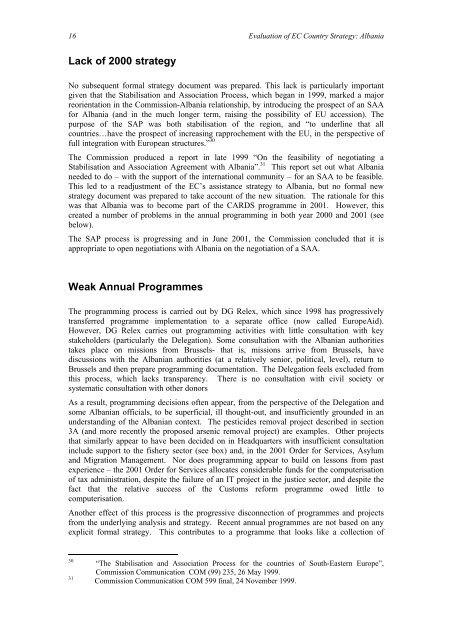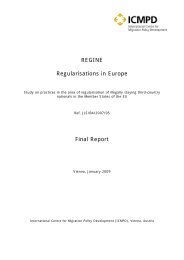Final Report - European Commission - Europa
Final Report - European Commission - Europa
Final Report - European Commission - Europa
You also want an ePaper? Increase the reach of your titles
YUMPU automatically turns print PDFs into web optimized ePapers that Google loves.
16<br />
Evaluation of EC Country Strategy: Albania<br />
Lack of 2000 strategy<br />
No subsequent formal strategy document was prepared. This lack is particularly important<br />
given that the Stabilisation and Association Process, which began in 1999, marked a major<br />
reorientation in the <strong>Commission</strong>-Albania relationship, by introducing the prospect of an SAA<br />
for Albania (and in the much longer term, raising the possibility of EU accession). The<br />
purpose of the SAP was both stabilisation of the region, and “to underline that all<br />
countries…have the prospect of increasing rapprochement with the EU, in the perspective of<br />
full integration with <strong>European</strong> structures.” 30<br />
The <strong>Commission</strong> produced a report in late 1999 “On the feasibility of negotiating a<br />
Stabilisation and Association Agreement with Albania”. 31 This report set out what Albania<br />
needed to do – with the support of the international community – for an SAA to be feasible.<br />
This led to a readjustment of the EC’s assistance strategy to Albania, but no formal new<br />
strategy document was prepared to take account of the new situation. The rationale for this<br />
was that Albania was to become part of the CARDS programme in 2001. However, this<br />
created a number of problems in the annual programming in both year 2000 and 2001 (see<br />
below).<br />
The SAP process is progressing and in June 2001, the <strong>Commission</strong> concluded that it is<br />
appropriate to open negotiations with Albania on the negotiation of a SAA.<br />
Weak Annual Programmes<br />
The programming process is carried out by DG Relex, which since 1998 has progressively<br />
transferred programme implementation to a separate office (now called EuropeAid).<br />
However, DG Relex carries out programming activities with little consultation with key<br />
stakeholders (particularly the Delegation). Some consultation with the Albanian authorities<br />
takes place on missions from Brussels- that is, missions arrive from Brussels, have<br />
discussions with the Albanian authorities (at a relatively senior, political, level), return to<br />
Brussels and then prepare programming documentation. The Delegation feels excluded from<br />
this process, which lacks transparency. There is no consultation with civil society or<br />
systematic consultation with other donors<br />
As a result, programming decisions often appear, from the perspective of the Delegation and<br />
some Albanian officials, to be superficial, ill thought-out, and insufficiently grounded in an<br />
understanding of the Albanian context. The pesticides removal project described in section<br />
3A (and more recently the proposed arsenic removal project) are examples. Other projects<br />
that similarly appear to have been decided on in Headquarters with insufficient consultation<br />
include support to the fishery sector (see box) and, in the 2001 Order for Services, Asylum<br />
and Migration Management. Nor does programming appear to build on lessons from past<br />
experience – the 2001 Order for Services allocates considerable funds for the computerisation<br />
of tax administration, despite the failure of an IT project in the justice sector, and despite the<br />
fact that the relative success of the Customs reform programme owed little to<br />
computerisation.<br />
Another effect of this process is the progressive disconnection of programmes and projects<br />
from the underlying analysis and strategy. Recent annual programmes are not based on any<br />
explicit formal strategy. This contributes to a programme that looks like a collection of<br />
30<br />
31<br />
“The Stabilisation and Association Process for the countries of South-Eastern Europe”,<br />
<strong>Commission</strong> Communication COM (99) 235, 26 May 1999.<br />
<strong>Commission</strong> Communication COM 599 final, 24 November 1999.
















